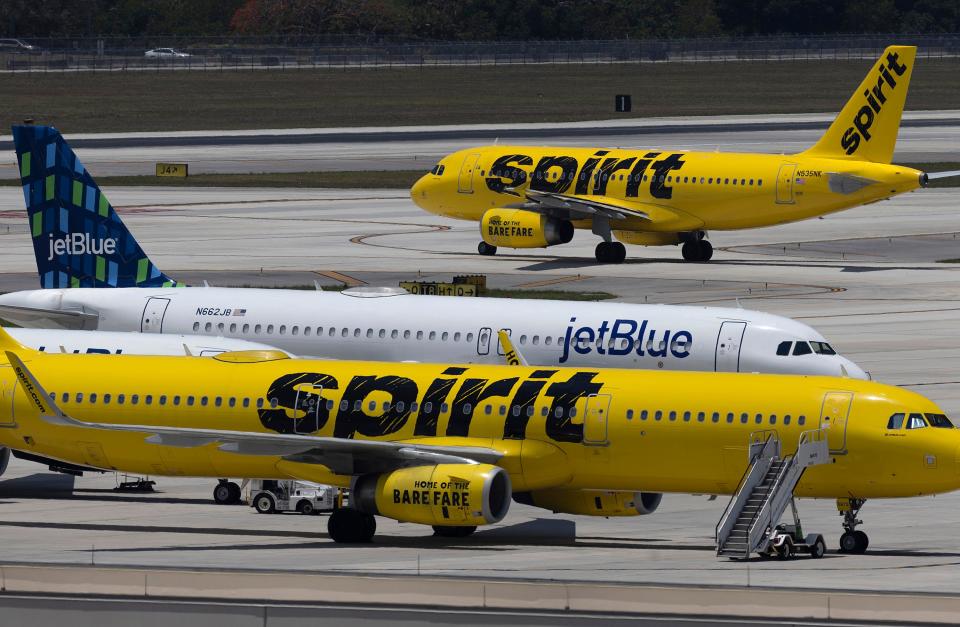US sues to block JetBlue-Spirit merger, saying the union would leave 'travelers to face higher fares'
The Department of Justice filed a lawsuit Tuesday to block JetBlue's bid to merge with Spirit Airlines, the opening salvo in a coming antitrust trial as the agency fights to prevent the carriers from combining.
The lawsuit, which was filed in federal district court in Boston, said that the deal would end direct competition between JetBlue and Spirit and eliminate Spirit, the nation’s biggest "ultra-low-cost carrier."
"We allege that if allowed to proceed, this merger will limit choices and drive up ticket prices for passengers across the country," Attorney General Merrick Garland said during a press conference announcing the lawsuit. "By acquiring Spirit, JetBlue will eliminate the largest ultra-low-cost carrier in the United States."
JetBlue CEO: 'We're obviously disappointed' about antitrust lawsuit in Spirit merger
JetBlue has previously made clear that they intend to push regulators to approve their bid and reaffirmed that position just hours before the announcement out of Washington.
JetBlue CEO Robin Hayes said Tuesday on "CBS Mornings" that he was "disappointed but not surprised" that the DOJ was moving to block the merger.
"We said when we got the offer approved by the Spirit shareholders last year that we didn't think we would close 'til the first half of 2024, you know, expecting a trial," he said.
New flights: JetBlue service to Paris set to begin in June, tickets now on sale for as little as $479

How did we get here?
JetBlue successfully bid for Spirit Airlines over the summer, after Spirit's board rejected a merger bid from rival ultra-low-cost carrier Frontier.
JetBlue offered $3.8 billion to buy Spirit, in a deal that would create the fifth-largest airline in the country.
According to William McGee, senior fellow for aviation at the American Economic Liberties Project, the merger would give travelers less choice in airlines and would likely lead to higher fares on many routes.
"Spirit is going to go away and when it does, the fares are going to go with it," he said. "You don't have to fly Spirit or Frontier or Allegiant to benefit from their presence."
Tell us your story: Mobility device lost or damaged by an airline? USA TODAY wants to hear about it
However, JetBlue insists merging with Spirit will have little effect on fares, and will actually position the airline to better compete with larger carriers in the U.S.
"A combined JetBlue-Spirit will bring together the best of both airlines to create a customer-centric, low-fare alternative to the dominant 'Big Four' airlines," a statement on the airline's website says.
JetBlue is also waiting on the result of an antitrust trial about its Northeast Alliance with American Airlines. A decision in the case, which was heard late last year in Boston, is expected imminently, and which DOJ officials said on Tuesday is harmful to consumers on its own merits, separate from the issues it alleged with the proposed Spirit deal.
"JetBlue's plan would eliminate the unique competition that Spirit provides – and about half of all ultra-low-cost airline seats in the industry – and leave tens of millions of travelers to face higher fares and fewer options," DOJ lawyers wrote in the suit.
Family travel: New DOT dashboard makes airline seat selection policies more transparent
What happens next with the JetBlue-Spirit merger?
As the merger moves toward trial, it's likely that JetBlue will continue campaigning for the deal in an effort to sway public opinion. It already has some strong supporters, including the Association of Flight Attendants, which represents Spirit's flight attendants.
"This is the first time in my 26-year career that our union has enthusiastically supported a merger," Association of Flight Attendants President Sara Nelson said during a press conference Tuesday. "This is the anti-merger merger," she added, saying it would position a larger JetBlue to "dilute the power that has accrued to those four mega airlines," namely American, United, Delta and Southwest.
The Transportation Workers Union, which represents JetBlue flight attendants, opposes the deal.
Donna Hitscherich, a member of the finance faculty at Columbia University's business school and a director of the school's private equity program, said that Nelson's position is a common school of thought when it comes to corporate mergers.
"There may be considerations toward making a stronger competitor," she told USA TODAY. "Maybe you are consolidating to making a stronger competitor to the incumbents."
However, the DOJ made clear in announcing the civil suit on Tuesday that it will fight to block the deal, which the agency views as anti-consumer.
"After spending many years criticizing consolidation in the airline industry, JetBlue seems to have changed its tune," Doha Mekki, principal assistant deputy attorney general for the antitrust division said during the press conference. "Rather than compete to win share, JetBlue has chosen to consolidate and cooperate."
The DOJ also said that a potential combination of JetBlue and Spirit would do the most harm to the most cost-conscious travelers, who would likely face higher fares if the deal goes through.
Contributing: David Koenig, Associated Press
Zach Wichter is a travel reporter based in New York. You can reach him at zwichter@usatoday.com.
This article originally appeared on USA TODAY: JetBlue-Spirit merger in peril: Justice Department sues to block union

